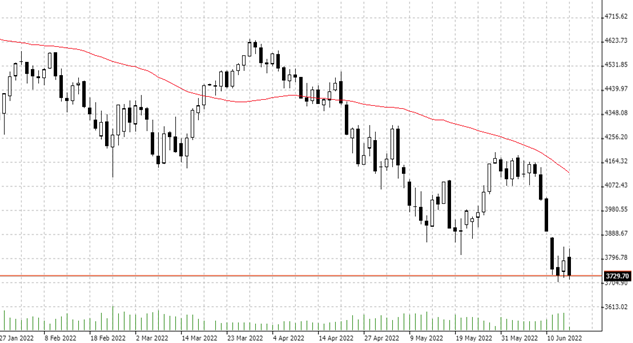

16.06.2022 – After the biggest rate hike since 1994, the Federal Reserve has unleashed a small short squeeze. But the question is, raising rates by 75 basis points is enough to contain inflation. For some investors, the Fed would have to raise the fed funds rate to 20 percent. For others, the Fed is simply powerless against the inflation monster of its own making.
The Fed pretends to be determined, but its actions are powerless. The key interest rate in the U.S. is now 1.75 percent – which is quite measly in view of inflation of 8.6 percent. Nevertheless, prices on Wall Street rose again yesterday. At 3,730, there are signs of a minimal bottom. It is quite possible that the S&P 500 – shown here in the daily chart – will make a run to the 50-day line. The trading desk at Goldman Sachs judged that by the end of the month and quarter, some $30 billion in built-up cash should flow into the stock market. But then it will head back down, it said.

Source: Bernstein Bank GmbH
Some investors warned that the Fed needs to be much more decisive. Bert Dohmen, owner of Dohmen Capital Research Group, used March 1980 as a model, when the federal funds rate was set at 20 percent. At that time, he said, inflation was at a record 14.8 percent.
Monster out of control
Others see the situation as completely hopeless. Fund manager, mega-pessimist and gold bug Peter Schiff criticized already one month ago, the Fed only pretends to fight the inflation. Because it is actually powerless, Schiff judged in an interview with the blog USWatchdog.com. De facto, he said, the Fed had created a creature with years of money glut and zero interest rates that it could no longer control. The president of Euro Pacific Capital said, “As the Fed was on this course of deliberately creating inflation, I always said this was going to come back and bite the Fed because they were going to let loose a monster that they were not going to be able to fight, like Frankenstein.”
Greater Depression
In fact, the Fed could no longer normalize interest rates to the extent that this would suck money out of the market – that would lead to a mega-crash. Schiff said: “We would have a financial crisis that would make 2008 look like a Sunday school picnic, and there will be no bailout if the Fed is fighting inflation. It wouldn’t be another ‘Great Recession,’ it would be a ‘Greater Depression.’ This is why the Fed can’t do anything. The Fed can’t do what Paul Volker did . . . and raise interest rates to 20%.”
The end is near
And therefore, he said, things would run their course because of the inability to curb inflation: The economy would shut itself down – like Covid only without Covid. Collapse in the U.S. job market. Dollar crash and gold bull market. Away from the financial market, he advised investors to hoard everything useful for daily life: toiletries, food, spare parts – everything. We are curious to see whether the monster scenario comes true – and wish all readers successful trades and investments!
Important Notes on This Publication:
The content of this publication is for general information purposes only. In this context, it is neither an individual investment recommendation or advice nor an offer to purchase or sell securities or other financial products. The content in question and all the information contained therein do not in any way replace individual investor- or investment-oriented advice. No reliable forecast or indication for the future is possible with respect to any presentation or information on the present or past performance of the relevant underlying assets. All information and data presented in this publication are based on reliable sources. However, Bernstein Bank does not guarantee that the information and data contained in this publication is up-to-date, correct and complete. Securities traded on the financial markets are subject to price fluctuations. A contract for difference (CFD) is also a financial instrument with leverage effect. Against this backdrop, CFD trading involves a high risk up to the point of total loss and may not be suitable for all investors. Therefore, make sure that you have fully understood all the correlating risks. If necessary, ask for independent advice. CFDs are complex instruments and are associated with the high risk of losing money quickly because of the leverage effect. 68% of retail investor accounts lose money trading CFD with this provider. You should consider whether you understand how CFD work and whether you can afford to take the high risk of losing your money.7
